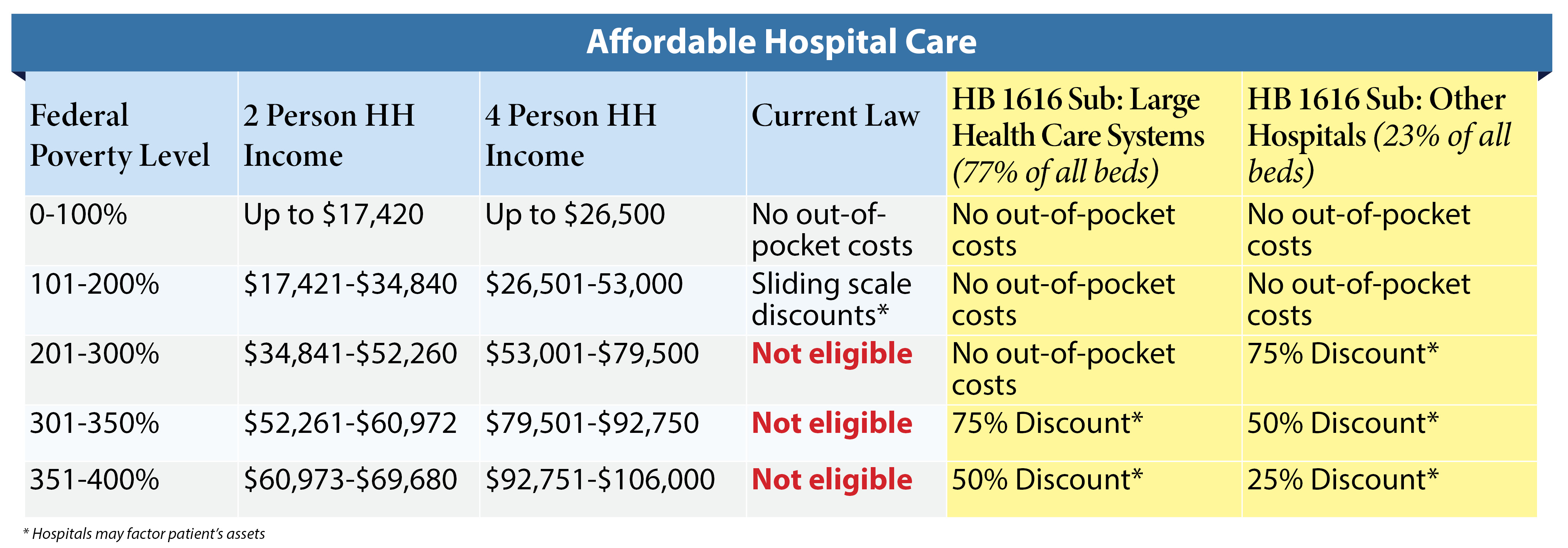Attorney General Request legislation ensures that millions of Washingtonians will pay no deductibles or co-pays at Washington hospitals
OLYMPIA — The Washington state House has passed Attorney General Bob Ferguson’s bill to increase access to affordable health care for millions of Washingtonians by a bipartisan 63-33 vote. The measure now heads to the Senate for consideration.
Ferguson is working with prime sponsor Rep. Tarra Simmons, D-Bremerton, and Reps. Eileen Cody, D-Seattle, and Nicole Macri, D-Seattle, on the bill, HB 1616. The bill more than doubles the number of Washingtonians eligible for financial assistance with their out-of-pocket health care costs at hospitals to about 4 million — an increase of 2.2 million Washingtonians over current law.
“Too many Washingtonians are just one hospital bill away from financial crisis,” Ferguson said. “Under current law, a single parent working two minimum wage jobs at 50 hours per week is not eligible for financial assistance at Washington hospitals — that’s not right and it needs to change. This bill ensures that help is there for those who need it.”
“When this bill is signed into law, Washington will have the best charity care laws in the nation, providing over 2.2 million Washingtonians with access to free or reduced healthcare,” Rep. Simmons said. “It will guarantee that a trip to the emergency room will not result in families losing their home or not being able to put food on the table. Washingtonians deserve access to essential care without having to worry if they will be bankrupted by a trip to the hospital.”
Rep. Joe Schmick, R-Colfax, proposed an amendment to exempt critical access hospitals from the bill’s requirements. Ferguson and Simmons’ legislation establishes two-tiers of financial assistance — one for large health care systems and large, urban hospitals and another for smaller, more rural hospitals. The discount levels in the latter tier are exactly the same as the discount levels Oregon requires all non-profit and public hospitals to honor, including small, rural hospitals. That Oregon law has been in effect for more than two years, and no rural Oregon hospitals have closed in that time.
Nationwide, about two-thirds of individuals who file for bankruptcy cite medical issues as a key contributor, and more than half of collection items on credit reports are for medical debts.
Access to care is also an equity issue, as communities of color are disproportionately underinsured, and especially vulnerable to catastrophic and unexpected medical expenses.
For example, according to 2019 data from the Federal Reserve, the median bank account balance for Black households is about $1,500, less than one-fifth the median balance for white households of $8,200. The median account balance for Latino households is about $2,000. One in five individuals in majority nonwhite zip codes have at least one medical debt in collections on their credit report.
 Bill significantly expands eligibility for financial assistance
Bill significantly expands eligibility for financial assistance
The bill significantly increases eligibility for full write-offs of out-of-pocket hospital costs, as well as expanding eligibility for discounts. The bill ensures all Washingtonians within 400 percent of the federal poverty level are eligible for financial assistance — approximately half of all Washingtonians.
Current law only provides full write-offs for those earning up to 100 percent of the federal poverty level — up to $17,420 a year for a two-person household — and sliding scale discounts up to 200 percent. Approximately 1.8 million Washingtonians are eligible for financial assistance under current law. Under current law, a single parent working two minimum wage jobs at fifty hours per week is not eligible for financial assistance at Washington hospitals.
AGO enforcement of charity care law
Ferguson has filed lawsuits against two Washington hospitals for violating Washington’s Consumer Protection Act by preventing low-income patients from accessing charity care.
Under state law, hospitals are required to:
- Provide notice of the availability of charity care both verbally and in writing;
- Screen patients for charity care eligibility before attempting to collect payment, and;
- Only require patients to provide one income-related document to prove charity care eligibility.
As the result of a 2017 lawsuit, CHI Franciscan provided $41 million in debt relief and $1.8 million in refunds, in addition to rehabilitating the credit of thousands of patients who were not offered charity care when they were eligible at eight of its hospitals in Washington. CHI Franciscan also paid $2.46 million to the Attorney General’s Office to cover the costs of the investigation and enforcement of the Consumer Protection Act.
Ferguson also sued Capital Medical Center in Olympia the same year over its charity care practices. To resolve the lawsuit, Capital provided at least $250,000 in refunds and more than $131,000 in debt relief. In addition, Capital paid $1.2 million to the Attorney General’s Office.
-30-
Washington’s Attorney General serves the people and the state of Washington. As the state’s largest law firm, the Attorney General’s Office provides legal representation to every state agency, board, and commission in Washington. Additionally, the Office serves the people directly by enforcing consumer protection, civil rights, and environmental protection laws. The Office also prosecutes elder abuse, Medicaid fraud, and handles sexually violent predator cases in 38 of Washington’s 39 counties. Visit www.atg.wa.gov to learn more.
Media Contact:
Brionna Aho, Communications Director, (360) 753-2727; Brionna.aho@atg.wa.gov
General contacts: Click here

 Other Languages
Other Languages